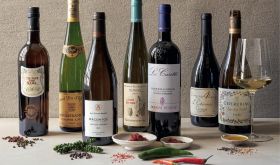1 June While the British media are flooded with coverage of next week’s general election, so intimately entwined with Brexit, we are today republishing free this article that considers what Brexit may mean for wine and wine lovers.
31 May In the last 10 days I have attended two briefings about the likely effects on the world of wine of Brexit, Britain’s withdrawal from the European Union in April 2019. The trade briefing at noon on the first day of last week’s London Wine Fair was absolutely crammed with anxious wine professionals. The event I was involved in the previous Friday at Chatham House in London brought together economists of international repute and members of the wine trade to listen to the predictions of prominent wine economist Professor Kym Anderson (pictured).
Apart from me, the one person who was at both sessions was Miles Beale, chief executive of the Wine and Spirit Trade Association, an ex senior civil servant who is busy briefing HMRC, the British customs authority, on the niceties of the drinks business. He stated at each event that his aim was to end up with absolutely no change to the current situation in terms of duties and tariffs, although this may be a bit optimistic. On the other hand, as he pointed out, ‘HMRC may be listening to us, but I am very aware that wines and spirits are so much less important to them than, say, banking and agriculture.’ He is hoping that the fact that the UK’s wine imports from the EU are worth roughly the same as our exports of spirits, chiefly Scotch, to the EU, will protect us from major shocks.
According to Beale, additional tariffs imposed on imports from the EU are anyway unlikely to be more than 10p a bottle and will probably be more like 4p, whereas the annual rise in UK excise duty last year alone was 8p a bottle, raising total duty to £2.16 plus VAT, so we shouldn’t get too exercised about any increased tariffs. Much more important probably will be the extent to which free movement of goods (‘the number one unknown’) and labour will be allowed (see below). Another important aspect is the extent to which winemaking practices are harmonised. The British will no longer be part of EU accords.
On the other hand, it’s going to be so devilishly difficult and time-consuming to negotiate new sets of protocols with every country that exports wine to the UK that the relevant parties might indeed throw their hands in the air and decide to keep things as they are – a result that may well be imposed much more widely than the wine sector, which, I was depressed to discover from Professor Anderson’s presentation, represents a mere 0.5% by value of all imports into the UK.
The British wine trade is still reeling from the effects of the post-referendum plummet of sterling by 10 to 15%. Cue fevered negotiations between importers and their suppliers to work out how this burden was going to be shared (even though of course the cost of the wine itself is just one element in the mix). The upshot has been that the big UK retailers have been putting up prices – and not before time. So competitive are they, and so arcane the way duty rate rises are announced to the public, that until recently the supermarkets were doing their best to hold prices steady, often with deleterious effects on wine quality. But now at least the general public can easily understand the devaluation of the pound and can see why the price of all wines, except home-grown ones, have had to rise.
As the Wine and Spirit Trade Association announced yesterday, the average retail price of wine in the UK is now £5.56 per bottle and rising rapidly. According to Miles Beale, ‘in just 12 weeks we have seen the average price of a bottle of wine shoot up 3%, compared to a 1% increase seen over a period of two years from 2015 to 2017. Unfortunately, for both British businesses and consumers, we would anticipate this to continue throughout the year. What is even more concerning is that this does not take into account the inflationary rise – at a painful 3.9% – on alcohol inflicted by the Chancellor in the March budget.’
But no one in any section of the UK wine trade wants to see massive price rises, especially since the still wine sector is looking vulnerable compared with other increasingly popular alcoholic drinks such as craft beer, gin and Prosecco. According to David Gleave MW of importers Liberty Wines, the net profitability of the UK’s 10 biggest wine distributors since the big economic dip of 2008 has been just 2.3%. ‘So if we end up with an erosion of gross margin, that’s the end.’
Liberty, and many of the newer, smaller wine importers, specialise in supplying the (so far) flourishing restaurant business in Britain’s cities. But they are all worried about the post-Brexit future. Already under pressure from the threat of steep rises in business rates and increases in food costs, restaurateurs and bar owners are finding it increasingly difficult to recruit the staff that currently come substantially from EU countries while there is still so much uncertainty about immigration controls. The proportion of British staff at our son’s three London restaurants today, for example, is only 15%. As Gleave points out, ‘we just don’t train enough people for our hospitality industry in the UK.’
Such are current pressures on the restaurant business, in terms of both space and cash flow, that the average wine order from suppliers has been shrivelling. Some establishments are treated to deliveries not just once a week but every day (as those out and about in London in the early morning can testify). Credit control is now a hugely important part of any wine importer’s business, but particularly those who supply restaurants. That said, if I want to be stimulated by new and interesting wines, I know I am far more likely to find that stimulation on the list of a decent new bar or restaurant than on most retail shelves.
But one real concern about any change to duties and tariffs is the logistics of importing wine into the UK. At the moment there is a smooth EU system that ensures that duty is paid in the destination country. But any change to this could make evasion of duty so much easier that Gavin Quinney of Ch Bauduc for one envisages much more personal buying direct from EU producers, suspecting that HMRC will not have the personnel available to enforce any new rules (good news for Purple Pagers?). As someone pointed out at the Wine Fair briefing, there are just 500 customs officials in the UK compared with 3,500 in the similarly sized German market.
When the system changes, it is all too easy to imagine massive queues at Dover, the chief port of entry from the EU, and importers will probably need to beef up their staff overseeing logistics anyway. Some concerned observers think that a massive expansion in bonded warehouse space and lorry parks will be needed, but it is difficult to imagine this being achieved within the next two years. (Shipments from outside the EU tend to come by sea in to Felixstowe, where the importation process has long worked relatively smoothly. And anyway the journey is much longer, leaving much more time to sort out documentation and so on.)
Although the doom-laden prophesies of Professor Kym Anderson (FT article, behind their paywall) about the likely shrinkage of the UK, and global, wine markets may be too pessimistic, it seems all too likely that it will become less and less profitable to promote branded wine in the UK and we will probably see many producers turning towards more attractive markets. Quinney reported that he was already investigating new importers for Ch Bauduc outside the UK and was thrilled to find them prepared to agree to more generous payment terms than his British trade customers.
There have been just a few small positives for the UK wine trade since the British voted to leave the EU. Devaluation of the pound immediately resulted in a temporary boost for Britain’s fine-wine traders, with Asian buyers in particular taking advantage of the sudden drop in prices in their currencies. This of course has led to a dramatic increase in fine-wine traders’ attempts to persuade customers storing wines with them to sell. Most of these fine-wine merchants and traders have created what is in effect their own internal marketplace such as Berry Bros & Rudd’s BBX. The biggest of the lot, Farr Vintners, reports that their customers’ reserves are worth £360 million, ‘so if we sold nothing but 10% of our customers’ reserves in a year, we would survive', according to Farr’s owner Stephen Browett when asked about the likely effects of Brexit on his business.
Other major beneficiaries are of course English wine producers, whose wines are suddenly looking much better value although, as Tamara Roberts of Ridgeview pointed out at Chatham House, all of their plant material, hardware and some expertise, comes from abroad and therefore now costs more.
And then there is the minor fact that once Britain is out of the EU, we Brits may find the sort of funds for promoting EU wines described in EU funds flow east lavished on us. Potentially good news for wine-fair organisers anyway.














